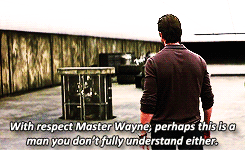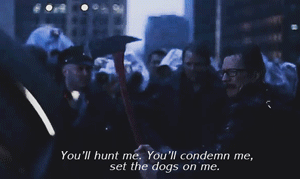Whether a fan of superhero movies or not, most agree that Christopher Nolan's 2008 film The Dark Knight was a classic for our time. Transcending the (admittedly fun) popcorn blockbuster formula, the penultimate chapter in Nolan's Batman trilogy was characterized by murky morality, a grounded but ambitious vision, and Heath Ledger's near-immortal performance.
Part of the power of The Dark Knight, and one of the biggest ways it differed from other superhero movies, is in its willingness to avoid having spotless heroes. By the end of the film, even Batman himself is left to a moral quandary, and we as viewers are left to wonder about just how far humans will go – for reasons both good, bad and in between – when under pressure.
Morally ambiguous or not, though, there is a lot we can learn from The Dark Knight, such as:
1. Tragedy matters – if it threatens us
When the Joker visits Harvey Dent in the hospital, he makes some disturbing but relevant commentary. As he talks to the incapacitated District Attorney, he notes that if he "blows up a truckload of soldiers," no one would care, "because it's all part of the plan." He continues to muse that if he says that the mayor will die, though, "everyone loses their mind!" It's certainly a disturbing analogy, but his point makes sense – we only panic when things don't go according to what we're used to. If tragedy strikes where we expect it – for example, a car bomb in the Middle East – we don't shed a tear, but when something tragic happens in the Western world we are much more attentive.
In short, the theory boils down to this – the closer the issue is to your life, the more you care.
2. Sometimes good inspires bad
"And in their desperation, they turned to a man they didn't fully understand."
When Alfred speaks these words to Bruce, he underscores the difficulty of Batman, something that Christopher Nolan explored at the end of Batman Begins – if those fighting against crime got tougher, crime itself was likely to get tougher too. In The Dark Knight, the mob doesn't just get tougher, they get desperate; after all, Batman has deposed their longtime leader and ruined many of their operations. When we do good, evil will fight back and often try to hit us where we are weakest, and it can be a cunning foe.
3. We're all capable of good and bad
Dent, meanwhile, was supposed to be the best hope for Gotham. Then he lost the only person we ever really saw him love in the film, not just because of the Joker but also because of corruption in the very structures of the city he wanted to save. Similar to how Bruce and Martha Wayne were "gunned down by the very people they were trying to help," Rachel was betrayed by the very people who she wanted to work with for good (some of whom had their own conflictingly deep reasons for the betrayal).
Both characters endured tremendous loss. Both chose separate paths. One became a hero, the other a murderer. And though our choices and circumstances might not be nearly so consequential as those in the film, it is true that our perspective in times of tragedy often leads us to significant crossroads that can corrupt even the best of us.
4. Is the truth always right?
As the film ends, and Batman and Gordon collude to blame the former for the murders committed by Dent in his vengeful rage , we're left with one of the blurriest resolutions a "blockbuster"-style film has ever offered. Certainly the logic behind the pair's decision makes sense; Dent was a more public figure of hope than Batman ever was, with widespread support and a record of rapid success that came through the justice system rather than vigilantism. Imagine if you learned that the only politician you ever trusted murdered five people – then you might understand why telling the public that the already-distrusted Batman was responsible made a lot of sense.
But even when lies seem like the most viable option, they're still lies. The danger, as Nolan explored briefly in The Dark Knight Rises, is in if the lie is exposed, as it eventually was in that third installment of the trilogy. When a lie is the foundation of what you build, whether in public or in a relationship, there is always the danger of its immediate implosion no matter how incredible things may look above the surface.
The ultimate lesson of the movie? Life is more complex than we like to imagine.





















